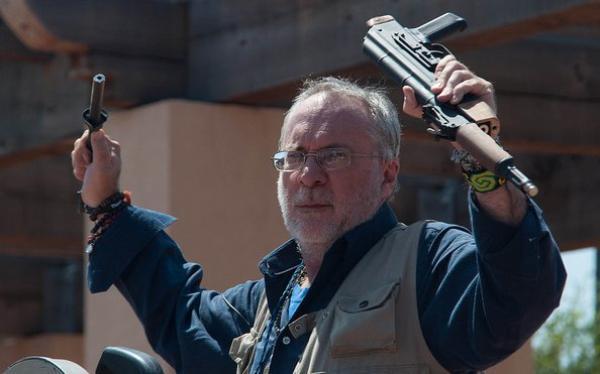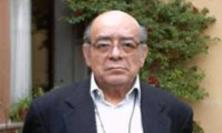Mexican President Felipe Calderon ends his six-year term in office at the end of this week. One of the biggest issues of his presidency has been the attempt to tackle drug-related violence in Mexico and there are many who have questioned his methods. One man in particular, Catholic journalist Javier Sicilia, has been critical of the role of the State in the drug wars. Gerald MacCarthy looks closely at Sicilia’s campaign, which even included a visit to the Vatican earlier this year.
When Pope Benedict visited Mexico in March this year, in his ‘Message of Hope’ he pointed out that economic inequality was hampering development and was a principal cause of the country’s drug and violence problem. He promised to place the Church at the disposal of the State so that together they could try to eradicate organised crime. But Bishop José Raúl Vera López OP of Saltillo, near the Mexican border with the United States, is far more direct in his assessment of the problem and in particular of the six years in office of the outgoing Mexican President, Felipe Calderon, and his Administration. The government is leaving, he says, ‘with close to a hundred thousand corpses all over the country, tens of clandestine burial sites, nearly forty thousand abductions, two hundred thousand people displaced…..’[1]
Before his visit to Mexico in March, Pope Benedict received a letter from someone who has been affected directly by this problem: the Mexican poet and journalist, Javier Sicilia, who lost his son, Juan Francisco when he was killed with friends by a criminal gang in March 2012. In order to raise awareness on an international level of the scale of the problem, Sicilia took his letter to the Holy Father in Rome before his visit to Mexico, which was just before Holy Week. It was written, he said, on behalf of all those parents who had suffered loss, just as God the Father himself suffered the loss of his Son, remembered by us on the Good Friday then approaching.
Javier Sicilia has never been afraid of wearing his Catholic heart on his sleeve and his letter to Pope Benedict is no exception. It is a passionate plea for understanding of the plight of those caught up in the drug war and a powerful illustration of how deeply the Mystical Body of Christ in these countries is suffering:
Mexico and Central America, Beloved Benedict, are at this moment the body of Christ abandoned in the Garden of Gethsemane and crucified between two thieves. A body, like that of Our Lord, on which has fallen all the force of delinquency, the omissions and grave corruptions of the State and its governments, the prohibition of drug consumption in the United States, their manufacture of arms which pass illegally to our country to arm the criminals, money laundering making available huge sums, a hierarchical Church which, with its exceptions and its best face in its religious, maintains the silence of an accomplice; and of a world – the American way of life – which has reduced everything to production, the consumer society and money.[2]
This is a movingly Pauline and prayerful letter, but at the same time it is a rigorous critique of Mexico’s political and ecclesial structures. What has led Javier Sicilia to make such serious accusations against both the Mexican State and the hierarchy of the Mexican Church?
Sicilia, the State and the Church
Throughout Calderon’s Administration, the Mexican State has believed that total war, using the armed forces as well as federal and local law enforcement, will put a stop to the outrage of drug war and its undermining of Mexican civil society, particularly in those states on or near the border with the United States. Opponents of the use of the Army and the Navy argue that they are not trained for policing; but there are many who agree with the president and believe that a firmer hand could help to address the situation, particularly the corruption of people in authority at every level who are tempted by the huge quantities of easy money available in the drugs trade, and so join in or look the other way. There are also a growing number of people who look at the situation just as Bishop Raúl Vera does and believe that all-out war has failed to produce results other than increasing violence and loss of life, and that the whole drug phenomenon should be viewed not simply as an issue of crime, but of public health. This might imply that the passage of drugs for sale into the United States from South and Central America should be legalised and that the addicts should be rehabilitated; this would curtail the current violence employed by drug cartels to protect their trade from the law and from rivals, with cheap arms available readily and legally in the United States.
But both of these are minority positions, held only by those closely affected by the drug trade: those whose daily lives are interfered with by the cartels, or who have lost a family member or friend. Their priorities are to end the impunity of the perpetrators of the violence and to bring recognition to the victims. The great majority, however, who are not directly affected, do not know what to do for the best. For example, the many millions who live in the central plains of Mexico give thanks to God that the drug war has not come directly into their lives and pray that it will not. They see from a distance the great power both of the cartels and the authorities, fear that it may be used arbitrarily and hope it will never be used against them. When seen in all its brutality in the papers or on TV, as it is daily, it is not as remote as comparable horror in Syria or Iraq, but neither does it seem part of everyday life. Unfortunately it is precisely that for a large and growing number of people in Central America and Mexico.
Sicilia believes that Mexican politics is incorrigibly corrupt and Mexicans should not participate in them until they have undergone a complete reform. He caused quite a controversy by advising his readers not to vote in the general election earlier this year, because in his opinion there was no uncorrupt choice available. But surely, it was argued against him, one should vote for the party most likely to bring change, even if it is not perfect? The party in question would be the socialist PRD (Partido de la Revolución Democrática – ‘Party of the Democratic Revolution’), but Sicilia responded by saying that they were as interested in getting hold of power and using it for their own aims as were those in the other parties. This goes some way to explaining his attitude to the Church in his letter to the pope. Most of the bishops, he thinks, are going along with the government line of total war against drugs, not necessarily because they believe it to be right, but because they want to keep on good terms with the government. That is the basis of his accusation of complicity. He is no friend of the Mexican hierarchy and for years has been quick to pounce on what he considers inappropriate, from putting the commercialisation of the image of the Virgin of Guadalupe in the hands of a transnational company, to what he saw as the cover-up of sexual abuse by priests. As is already probably clear, he does not mince his words when he wants to make a point, and he once went as far as accusing the Archdiocese of Mexico of being more like a business riddled with corruption than the face of the living Church.[3]
Concern for the victims
In their investigations into child sexual abuse, Sicilia and his colleagues were perhaps more conscious of the suffering of the victims than was common at the time and demanded justice for them. Most journalists a decade ago were more interested in the facts and the Church’s attempts to cover up the scandals and protect the perpetrators. It was this same concern for the victims, but now of organised violence, that motivated him to establish his Movement for Peace with Justice and Dignity (MPJD) in April 2011, just weeks after the death of his son. In this present period of widespread organised violence, there are two categories of victim: those who suffer physical harm or death directly; and those whose trauma is the loss of someone dear. All of them are victims, insists MPJD, and nowhere near enough is being done to recognise them, let alone to help the recovery of those who have lost loved ones. It is true that totals of dead and missing over the last six years can vary widely, pointing perhaps to a lack of cohesion between military, federal, state and local authorities. But, says MPJD, there should be an accurate account kept reflecting the individual dignity of each victim, and every victim should be commemorated individually in a memorial.
The president claims that he and his government are in agreement with these aims of MPJD, and at his first meeting with the group in summer 2011 he promised to plan a memorial for the deceased and to propose and pass a law to support the living victims. He and his cabinet were heavily criticised by MPJD for not having done enough about either when they met for a second time three months later. Is the delay in the fulfilment of these promises due to a lack of liaison between different authorities, as the government would claim, or a lack of concern for the ‘collateral damage’ in the war on drugs, as the MPJD would have it? Whatever the answer, Sicilia and his companions will continue to demand the satisfaction from the incoming Administration that they have failed to receive from Calderon’s government.
‘Caravan for Peace’
With the same intent of winning recognition for the victims and putting them first, MPJD met just before the July 2012 elections with the four presidential candidates. They all got a dressing down from Javier Sicilia, who told them individually how they were part of a corrupt system that could not be saved and why he was going to vote with a blank ballot paper. The idea of a unity pact between parties was suggested to combine efforts for the victims, but nothing has so far come of it. Undeterred by this apparent failure to move the politicians, MPJD has also tried to take its message directly to the people, by organising a series of journeys of what it calls a ‘Caravan for Peace’. The first journey, in the summer of 2011, started in Sicilia’s home town of Cuernavaca, south of Mexico City, and headed north. Its destination was Ciudad Juarez, on the US border, where the previous year over 200 people had been killed by organised crime, the worst record at the time of any district in Mexico. The idea attracted the Mexican press and Sicilia and his companions were able to make their case for the victims as they stopped at towns along the route. Some of the victims themselves got a chance to plead for justice for a murdered relative or the safe return of one abducted. The caravan then toured successfully around the South of Mexico, and the most recent adventure in September 2012 saw two busloads of about 100 members of MPJD visiting 29 cities in the US, ending in Washington DC.
Although the MPJD planners chose about the very worst time to attract publicity, with election fever mounting and both the Republican and Democratic Party conventions during this period, they nevertheless managed to make a mark and attract local as well as Mexican attention. In the US the group has placed its emphasis on ending arms sales and money laundering. In Phoenix, Arizona, Sicilia demanded that the anti-immigrant Sheriff Joe Arpaio of Maricopa County take a more humane position on illegal immigrants and control the supply of automatic weapons. But he received the reply he must have had often from others: ‘And you, control the flow of drugs!’[4]
The future of MJPD and its mission are in the balance. In a whirlwind 18 months it has awakened the conscience of many, but will that settle into something more concrete and lasting? Sicilia admits that MPJD cannot be a substitute for the state, implying that the movement must grow into a lobby that can convince the authorities in Mexico and the United States that their present policy is a disaster. He is not alone in his aims: there are many individuals and non-governmental organisations – Church and lay – working to bring solace to those suffering and make the reality of the situation known. The heroic work of Fr Alejandro Solalinde and his colleagues in sheltering Central American immigrants on their perilous journey to the US is just one example; the 30 years that Rosario Ibarra and her group, Eureka, have dedicated to demanding the return of her son and others who have disappeared without trace, is another. There are clearly many in Mexico who share Sicilia’s disillusion with Mexican politics and his desire for renewal, but it remains to be seen whether this could become focused and powerful enough to change the present system.
The late Gerald MacCarthy lived in Mexico City for over 30 years and worked in education and journalism.
[1] Reported in La Jornada, 4 September 2012
[2] This is an extract from the letter, in my unofficial translation. The full text is published in the Mexican Weekly, Proceso, No. 1846, 18 March 2012.
[3] Cf. Javier Sicilia, ‘Estamos Hasta La Madre’, Editorial Planeta México, 2011, p. 250.
[4] Reported in La Jornada, 17 August 2012





